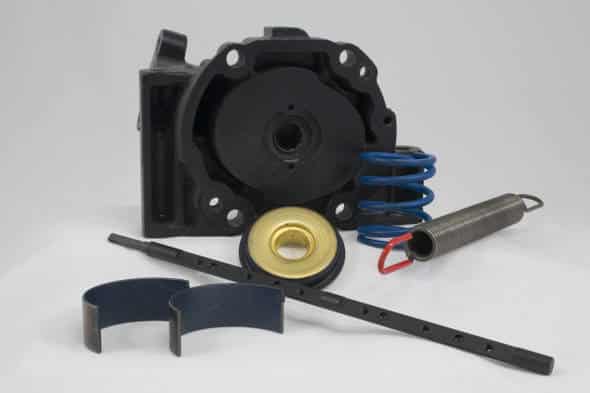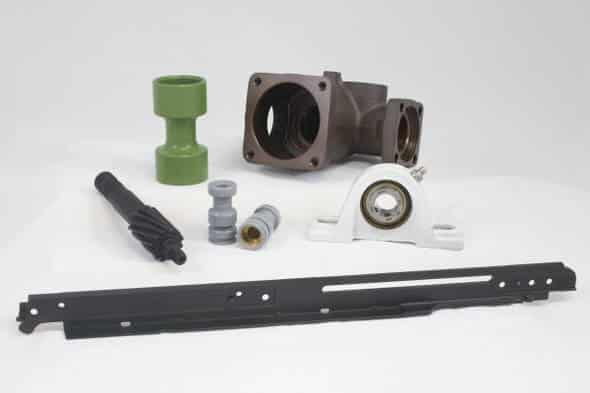PTFE coatings, known by many as Teflon®, is a remarkable coating with a wide variety of applications. While most commonly associated with non-stick coating for cookware, Teflon® coatings have many uses across a wide number of industries.
Although it’s been around for nearly seven decades, Teflon® coating services remains highly popular for a variety of applications. Industry experts predict that Teflon® production will surpass 240,000 tons by the year 2017. Back in the late 40s, only about 900 tons of the substance were produced.

Teflon® coatings have a number of properties that make it useful to many industries. PTFE coatings are resistant to corrosive chemicals, provides good insulation from electricity, doesn’t absorb water, can withstand extremes of heat and cold, resists UV rays, and creates little friction. Many industrial Teflon® coatings can withstand temperatures as low as -250ºF without loss of physical properties and can operate continuously at temperatures up to 260°C/500°F. Teflon®’s non-stick coating has become so legendary in our culture that seemingly untouchable politicians and public figures are often nicknamed “Teflon®” in the media.
In addition to its uses in cookware, industrial Teflon® coatings are often used in the automotive industry, cabling materials, optical devices, pharmaceutical applications, pipes, valves, and more. Companies interested in how Teflon® can work with their products should contact Orion Industries, a Chemours Licensed Industrial Applicator that specializes in applying industrial Teflon® coatings to various products.
History of PTFE Coating Services
PTFE’s discovery was a happy accident. In the late 1930s, Roy Plunkett discovered PTFE while working as a chemist for Kinetic Chemicals. Plunkett was trying to develop a new refrigerant, but while working with gases he developed a waxy white covering that was slippery. Subsequent tests revealed several possible uses for Plunkett’s new substance, and it was subsequently patented in 1941 and trademarked as Teflon® in 1945.
The new substance quickly found a variety of uses, and by 1948 Kinetic Chemicals’ parent company, Chemours, was manufacturing more than 2 million pounds of it each year. Teflon® was used in the Manhattan Project to coat valves and seals in pipes storing uranium hexafluoride, and by the 1960s it was commonly being used as non-stick coating in kitchen cookware.
Over time, PTFE coatings have been further refined. In the 1990s, manufacturers began radiation cross-linking it to allow it to be more easily recycled.
How a PTFE Coating Works
A PTFE coating’s unique makeup is what provides it with the non-stick, non-friction, and dielectric properties that make it useful in so many applications. Teflon® coating is a fluorocarbon solid, meaning that it has a high molecular weight made up solely of carbon and fluorine. This make up makes it resistant to water, gives it a low friction co-efficient, and makes its other useful properties possible.
What Coatings Are Similar To PTFE?
Though PTFE is the most widely used thermoplastic polymer for non-stick, insulating, low-friction, and non-reactive end uses, it isn’t the only option. Three popular alternatives include:
- Fluorinated Ethylene Propylene (FEP)
- Perfluoroalkoxy (PFA)
- Ethylene Tetrafluoroethylene (ETFE)
Each of these alternatives slightly alters the end uses, method of application, and material characteristics associated with PTFE. For instance, FEP offers very similar non-stick, low-friction, and non-reactive properties when compared with PTFE. However, it begins to break down at a slightly lower temperature and resists cracking under stress. ETFE exhibits a much lower density than PTFE while also being slightly more reactive, which has led to its use in aerospace insulation and chemical processing applications.
How PTFE Coatings are Applied
“Raw” PTFE comes in two basic forms, namely a powder and a liquid, and each has distinct methods of application. For instance, smaller items can be dipped and then spun to remove excess material. The final option involves negatively charging the PTFE particles with an electrode-equipped spray gun and providing an electrostatic coating. The final step after any of these applications involves curing the PTFE-coated object at high temperatures.
Uses of PTFE Coatings
While most people think of skillets and pots when they think of Teflon® coatings, the truth is that half of all PTFE production is used for wiring in aircraft and computers. PTFE’s dielectric properties and high melting temperature make it ideal for insulation cables and connector assemblies. Printed circuit boards used at microwave frequencies also often use PTFE as insulation. Good insulation is vital to safety, and that’s why so many industries trust PTFE, a time-tested coating that gets results.

PTFE coating services are also frequently used to coat the inside of fuel and hydraulic lines. Because fluids may flow slowly in colder temperatures and higher altitudes, PTFE coating’s low-friction coefficient makes it helpful in ensuring these substances continue to flow as needed.
With regard to industrial applications, Teflon® coating’s low friction is helpful in applications where parts may slide against one another, such as gears, slide plates, etc. A PTFE coating performs far better than other coatings, such as nylon and acetal, in these applications.
In food and beverage industries, Teflon® coating services are useful when a non-stick surface is needed. Its high resistance to heat is also beneficial in cookware, as it will not degrade when placed in ovens or on cooking surfaces.
With regard to medical applications and laboratory research, PTFE coating for pipes, tubes, and vessels is helpful in that PTFE can be treated to become highly resistant to chemical corrosion and contamination by microbes. This helps ensure that biomedical applications and research projects are accurate, untainted, and safe.
Orion Industries Ltd. engineers can work with industries to determine whether a PTFE coating would be beneficial to their products. Specialized industrial Teflon® coatings can provide cost-effective and helpful insulation and protection to a wide variety of purposes. In addition to Teflon®, Orion Industries can apply a variety of other coatings to products as appropriate.
While Teflon® coating services may not be appropriate for every project, for many applications in a wide variety of fields, it’s the No. 1 choice for a non-stick, water resistant, dielectric coating. With Orion Industries’ help, your company can determine whether it’s the right coating for your materials.
Is Teflon Coating Safe to Use?
With increased public preference for natural products, scrutiny has fallen on PTFE, making some wonder if it’s safe. The answer is (for the most part) a resounding, “Yes!” To understand this, you first need to know how PTFE behaves at various temperatures.
At 392 °F, PTFE begins to exhibit signs of pyrolysis (i.e., thermal decomposition). A 1955 study presented at the American Industrial Hygiene Association Annual Meeting showed that this decay doesn’t produce any byproducts in significant amounts to hurt humans. When temperatures reach 500 °F, PTFE starts to break down. The good news is that this temperature is far beyond the smoke point of most oils, meaning it’s highly unlikely that consumer-grade applications of PTFE would ever begin to degrade in this way when properly used.
In short, PTFE coatings are safe and effective when used properly. Still, care should be exercised in explaining to end users not to overheat PTFE-coated products.
Summary
PTFE, or Teflon®, coatings provide protection against water, corrosion, friction, and more. In the 70 years since its discovery, a variety of industries have come to view Teflon® as the go-to coating for thousands of applications.
Bio: Orion Industries, Ltd, a Chemours Licensed Industrial Applicator, (https://orioncoat.com/) applies Teflon® coatings and more than 500 other proven functional coatings to a wide variety of products. Orion Industries works with manufacturers to determine the right coating for their products and can quickly turnaround prototypes. An ISO 9001:2008 registered, Chemours Licensed Industrial Applicator of industrial Teflon® coatings and other coatings, Orion’s modern facilities allow it to quickly and reliably produce coated products.
Contact us to learn more about our PTFE coatings and which one would be right for your project.